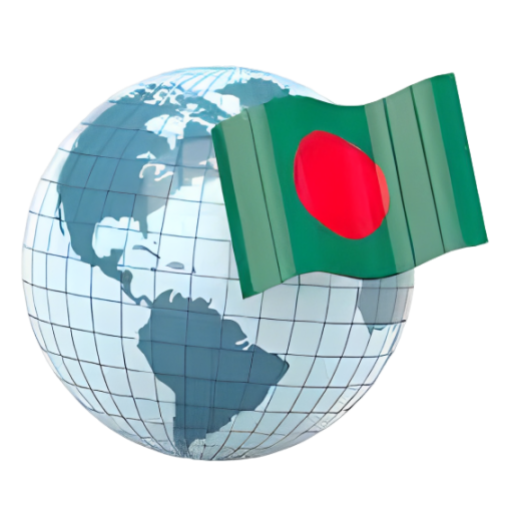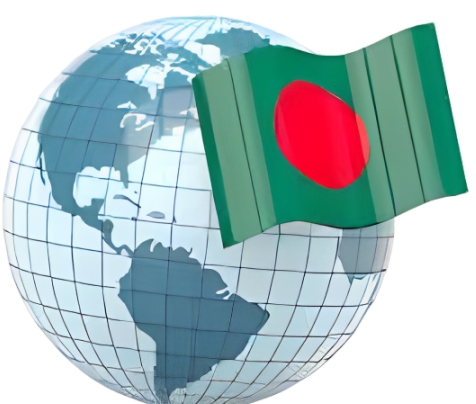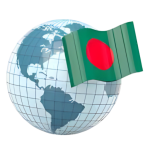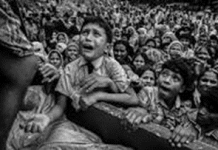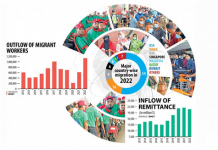The third issue of Global Bangladesh includes articles covering diverse issues concerning Bangladesh and the Bangladeshi diasporic community. In the section on Bangladesh, Hossain Zillur Rahman, a leading scholar and practitioner of development studies and policy, provides an overview of massive transformations in rural Bangladesh involving mechanization of agriculture, high-yielding varieties of crops, education, micro credits, improved transportation, and non-farm activities. He also highlights huge knowledge and research gaps concerning the “new rural” of Bangladesh about new class and power relations, social conflicts, and the position of small farmers vis-à-vis commercial farmers. Knowledge gaps also exist, if I may add, in topics such as inter-generational mobility in rural areas and availability of “community goods and services” (such as playgrounds, libraries, and community centres) as adequate provisioning of public services (such as quality healthcare and education).
Once a byword for natural disasters, Bangladesh now represents a successful story in managing and recovering from natural disasters. Chowdhury Emdad Haque in his article narrates the resilience of Bangladesh from natural disasters such as cyclones and floods. He also discusses how the roles of governments, NGOs, and other stakeholders made a difference.
About one million Rohingyas now live in refugee camps in Bangladesh. We have included a poem by Shahida Win (a Rohingya) to create awareness among the global community regarding the challenges facing Bangladesh hosting thousands of Rohingya refugees and their plights. The poem portrays the struggles, resilience, and hardships faced by the Rohingya community, capturing their journey and the plight of those seeking refuge from a land torn by demons and injustice.
The second section contains several articles written by members of the Bangladeshi diaspora community.
Historically, London symbolises the location of the Bangladeshi diasporic community. However, this community is now spread over many cities in the UK. Over the years, Scotland (a region known for its scenic beauty and a history of intellectual enlightenment) especially Glasgow, has drawn hundreds of Bangladeshi immigrants. Through my interview, Dr. MA Rashid (a physician who has been living in Glasgow for about six decades) provides glimpses of activities of the Bangladeshi diaspora community in Glasgow. He also describes his contributions to various community and health projects in his rural village in Bangladesh.
Every year thousands of Bangladeshis embark on a perilous journey in search for work in different parts of the world. They often are victims of vicious agents and human traffickers. Ishtiaq Mannan narrates the story of কানা ফারুক who symbolizes the conditions of many Bangladeshi migrants working in many countries.
Since the independence of Bangladesh, thousands of Bangladeshis have settled in Australia. The Bangladeshi diaspora community in early periods faced many challenges, for example, maintaining a balance involving multiple identities such as Bengali identity, Islamic identity, and the identity of the host country. Early immigrants also faced overt and subtle forms of prejudice and discrimination in host countries. Pushkin Rahman in his article describes in detail how he grew up in a predominantly white environment in Sydney, Australia, how his parents helped the new Bangladeshi people in Sydney, and how his parents continued to maintain connections with Bangladesh.
Canada became a popular destination for higher studies for many Bangladeshi students since the mid-1970s, especially with the availability of teaching assistantships. By the early 1980s, the University of Manitoba hosted a good number of Bangladeshi graduate students. In the 1980s the Bangladeshi diaspora community was quite small, but close-knit. Habiba Zaman in her article reminisces about her days in Winnipeg as a student at the University of Manitoba. Bangladeshi students at this university earned the admiration of professors. Habiba Zaman describes the activities of Bangladesh Student Association including seminars. She also provides glimpses of interactions with her professors and mentors such as Louise Sweet and Raymond Wiest in amazing detail.
Australia was the fourth country, and the first among developed countries to recognize Bangladesh as an independent country, and established its resident mission in Dhaka on 31 January 1972. During the last five decades, the Australia-Bangladesh relationship has flourished. Hundreds of students from Bangladesh now study in Australian universities. Nira Rahman describes how education, especially higher education in Australia, has become an important dimension of bilateral relationship and cultural diplomacy.
In recent years, Canada has become an attractive country for immigrants including Bangladeshis. Canada has also become a safe haven for those who have illegally accumulated money in their home countries and are investing in real estate properties in Canada’s major cities such as Toronto. Nusrate Aziz and Anis Chowdhury describe how illicit foreign money is affecting housing prices in Toronto.
The third section contains articles relating to travel experiences. Mahbuba Alam narrates her experience about traveling in Rwanda, a country that had witnessed a tragic history of an inter-ethnic genocide. However, Mahbuba Alam was impressed by scenic hills, enchanting lakes of Rwanda, and friendliness of Rwanda’s people. She also found similarities between Bengali cuisine and Rwanda’s cuisine.
Road tripping across the vast areas in North America must be a fascinating experience. Golam Sarwar describes his long trip by road across the western part of the United States. He presents his experience from a geological perspective.
The fourth section of this issue contains tributes to two prominent Bangladeshi persons who have recently passed away. Munir Quddus discusses the accomplishments of Professor Nurul Islam, an internationally renowned economist, who was the architect of economic policy in the immediate, and challenging post-liberation period.
Mustafa Chowdhury highlights the accomplishments of Ehsanes Saleh, an eminent statistician who was a professor at Carleton University in Ottawa (Canada). He also notes Professor Saleh’s distinguished professional standing for his outstanding contributions to the discipline.
The next issue of Global Bangladesh will be devoted to Bangladesh’s liberation. We intend to include articles reflecting on Bangladesh’s aspiration and struggle for independence. We shall welcome memories of freedom fighters and articles on the contributions of Bangladeshi diaspora to Bangladesh’s liberation struggle. The deadline for submission is 15 November, 2023.
